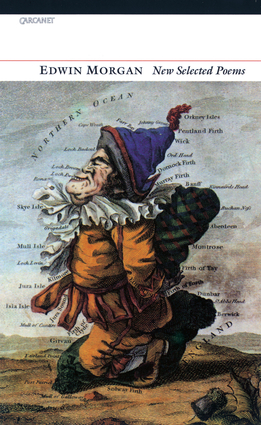

New Selected Poems: Edwin Morgan
POETRY
180 Pages, 216 x 135
Paperback, $23.00 (US $23.00) (CA $31.00)
Publication Date: April 2000
ISBN 9781857544596
Overview
Edwin Morgan's original Selected Poems was published in 1985. It became something of a classic, selling in excess of 20,000 copies. But 1985 is a long time in the world of so inventive and irrepressible a writer as Edwin Morgan. He has published a new Collected and several individual volumes, as well as his essays and celebrated translations. This New Selected Poems contains most of the work included in the popular 1985 volume, to which Morgan adds a wealth of later material. The complete sequence of Sonnets from Scotland appears in book form for the first time, the poems gaining in relevance now that Scotland's Parliament has been established. Morgan is the unofficial laureate of the new Scotland. Hitherto uncollected is the ambitious and magnificent Planet Wave, a suite of ten poems covering the history of the earth from the Big Bang to the time of Copernicus. It was set to music by the jazz saxophonist and composer Tommy Smith, and was first performed at the Cheltenham Jazz Festival in 1997. Morgan is unique among British poets in the range and courage of his experimentation, his openness to the poetries of other languages and to the poetry of science and science fiction. He explores language less as a medium than as an abundant, self-renewing human resource. However spectacular his leaps in time and space, he always comes back to ground in Scotland, in Glasgow, in a present tense which he inhabits with exuberance and hope, and without cultural regrets. He is a celebrator: his work, with its Scottish and European perspectives, is at once sophisticated and popular.Author Biography
Edwin Morgan was Scotland's first national poet - Scotland's version of the Poet Laureate - and one of the best-loved and most significant poets of the twentieth century. Born in Glasgow in on 27th April 1920, he was brought up in a comfortable middle class family with his father working as a clerk to a firm of ship breakers. From an early age Morgan was fascinated by, and passionate about words; he remembered his teachers complaining about the amount of work he would give them to mark. His early education was at Rutherglen Academy, then Glasgow High School. He was a resident of Glasgow for the duration of his life, apart from his six year service in the Middle East with the Royal Army Medical Corps. On his return he completed his Master's degree at Glasgow University before teaching there, becoming Professor of English in 1975. He retired as Professor Emeritus in 1980. He subsequently worked as a Visiting Professor at Strathclyde University (1987-1990) and also at the University of Wales, Aberystwyth (1991-1995). The poet Robert Crawford, a former pupil of Morgan's, remembers him as 'an extremely lively teacher ... incredibly focused on what his students were doing.' Morgan was an adept linguist, particularly in Russian, French, Italian, German, Spanish, Portuguese and Hungarian. This is demonstrated in his translations of Mayakovsky, Racine and Neruda, which he characteristically translated into robust Scots, and which appear in his Collected Translations. His prolific career was also a prize-winning one. Morgan was awarded an OBE in 1982 and the Queen's Gold Medal for Poetry in 2000, and his collections have several times been selected as Poetry Book Society Choices and Recommendations. He was awarded the Royal Bank of Scotland Book of the Year Award in 1983, the Soros Translation Award (New York) in 1985 and won numerous Scottish Arts Council Book Awards. His poetry collection, Virtual and Other Realities, won the Stakis Prize for the Scottish Writer of the Year 1998. His final Carcanet collection, A Book of Lives (2007), won the Scottish Poetry Book of the Year award and was shortlisted for the T.S. Eliot Prize for Poetry. Morgan's poetry is praised for its inventiveness and its moral and social observations. He wrote concrete and visual poetry, opera libretti and collaborated with jazz saxophonist Tommy Smith to put his work into music. His work is also renowned for its outwardly-looking internationalism, moving his poetic gaze from Europe to the wider world and into space, but always returning to his native Glasgow. Edwin Morgan died in Glasgow on 19th August 2010, several months after celebrating his 90th birthday.




